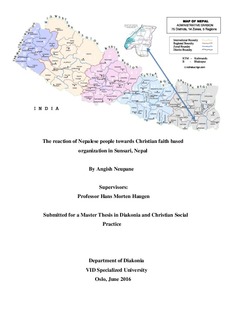The reaction of Nepalese people towards Christian faith based organization in Sunsari, Nepal
Master thesis
Permanent lenke
http://hdl.handle.net/11250/2400321Utgivelsesdato
2016-08-22Metadata
Vis full innførselSamlinger
Sammendrag
Nordstokke (2013) and Clarke (2006) state that there has been increasing interest in
the contributions of Faith Based Organizations (FBOs) as development actors.
Consequently, donors and international organizations have of recent not only
recognized the importance of the FBOs in development but also involved them in
international development programs, including bodies like the World Bank. The
FBOs’ characteristics which distinguish them from other NGOs, for example; their
moral and spiritual values and their connectedness grant them an ability to mobilize
faith communities and engender development.
While such organizations work in communities which may be of different faith than
themselves, there are potential tensions and suspicions that may rise in communities,
as the host religions may not want the FBOs to proselytize. In this paper, the FBOs
that work in Sunsari a district of Nepal are assessed in terms of their contribution to
the community, and how the community beneficiaries and non-beneficiaries perceive
their presence in the area. Clarke has provided a useful description of FBOs and how
it corresponds to their work in relation to the issue of seeking converts. It is a
qualitative and explorative study which seeks to understand the perceptions of the
people towards the work of FBOs working in the area. Using semi-structured
interviews data was collected and thematically analyzed.
The findings show that the work of FBOs in Sunsari has done a commendable job in
the transformation of the lives of the people of Sunsari. Social-economic
transformation has been a positive development that the FBOs have brought to the
area. The study also observed that there is were suspicions from the community over
the claims that the FBOs are engaging in development work hidden agenda of
winning converts. The study using sense of community theory has argued for the need
that the FBOs should integrate more by allowing access and participation of the local
community which will help to build trust and increase social cohesion.
